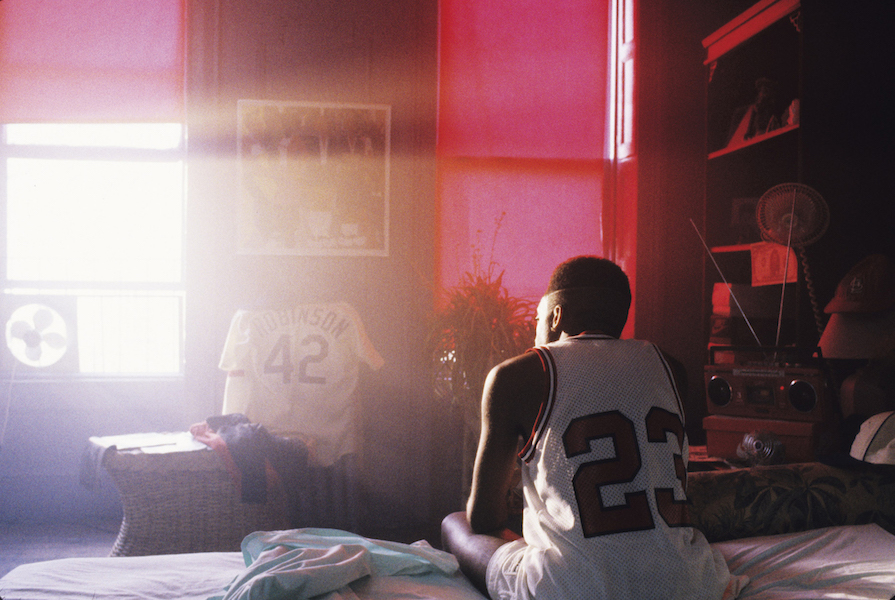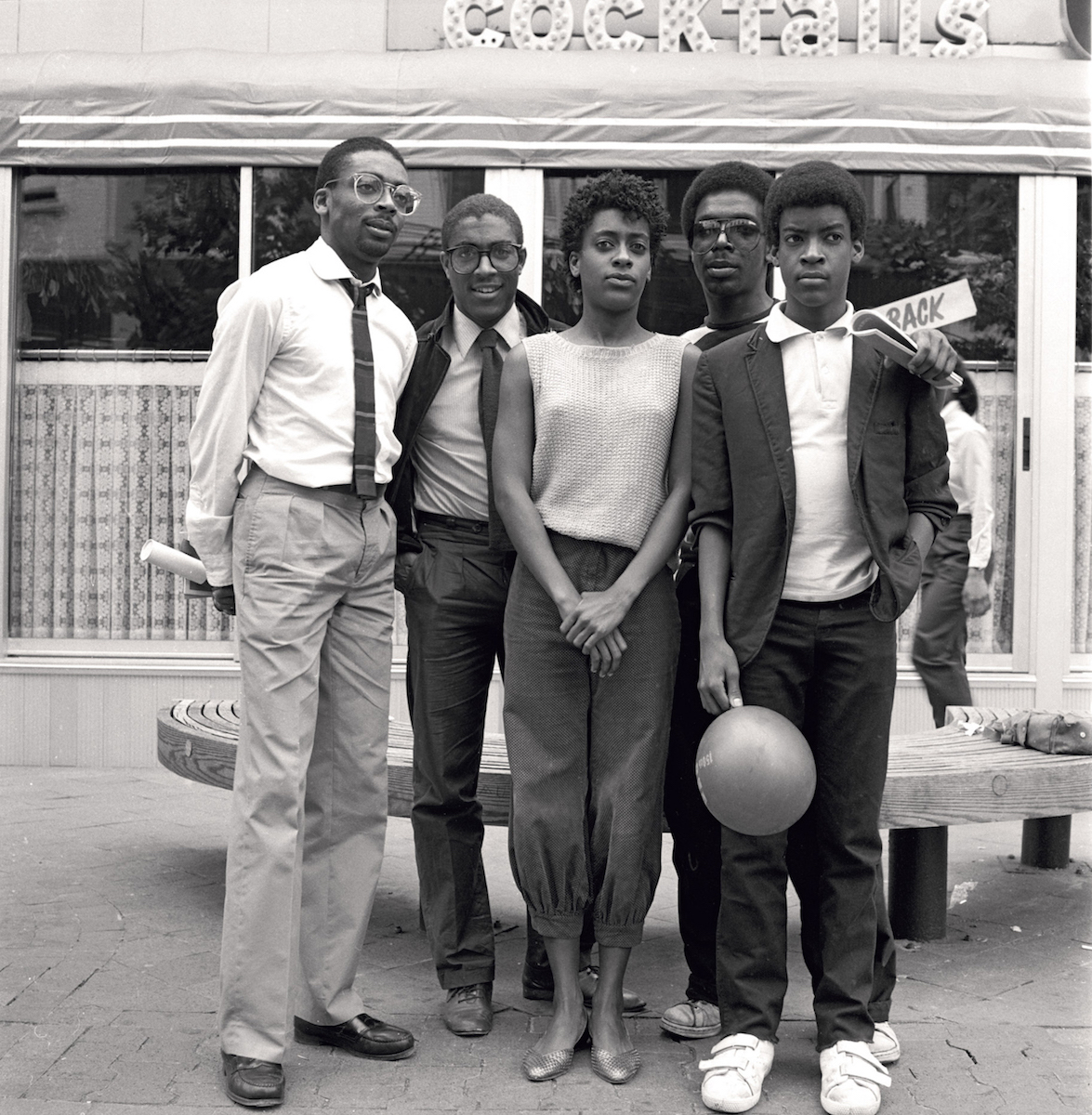A glimpse behind the scenes of Spike Lee films
- Text by Miss Rosen
- Photography by David Lee

“It’s like a family album,” photographer David Lee says of Spike (Chronicle), the visually dazzling celebration of Spike Lee’s groundbreaking film career. Spanning five decades, Spike offers a film-by-film look behind the scenes, replete with film stills, on-set photographs, personal images and insights from Spike Lee.
As Spike’s younger brother, official on-set photographer, and lifelong collaborator, David Lee has played an integral role in the family business — one that took root in Brooklyn. In the late 1960s, the Lee family moved to Fort Greene and bought a brownstone on the park. “There was so much creativity in the house. Our dad is a musician: he taught me piano, Spike played violin, and my sister Joie played bass. My mom was an educator so we knew about the Harlem Renaissance.”

Spike Lee as Mookie in “Do the Right Thing,” 1989 Universal City Studios, Inc.

Spike Lee directs the short film for Public Enemy’s “Fight the Power,” 1989, by David Lee
Lee remembers admiring the work of his brother Chris, a trailblazing graffiti writer who went by the pseudonym SHADOW. Though Lee couldn’t draw, he discovered a way to visually express himself through photography — and, as fate would have it, such a skill would serve the burgeoning family business well.
“Spike was always the general,” Lee remembers. “Whether shooting something for his films or wanting me to be the catcher on the baseball team, he was always organising.”
With his distinctive mix of history, drama, satire, and style, Spike Lee has transformed the landscape of filmmaking to broaden the way Black stories are seen and told. David Lee’s poignant and evocative photographs made on the set of films including Do the Right Thing, Malcolm X, Crooklyn, 4 Little Girls, and Summer of Sam, offer a glimpse inside the iconoclastic mind of the auteur.

Denzel Washington as Malcolm X outside the Apollo on 125th Street, from “Malcolm X,” 1992, by David Lee. Warner Brother Studios All Rights Reserved.

My High School Graduation With My Grandmother. Courtesy of Spike Lee.
“Spike is not just incredibly visual, but he has always had a sense of how to promote something,” Lee says. “When we were working on Mo’ Better Blues, he had this concept inspired by [jazz photographer] William Claxton. It was a little sub current to the movie. When I got a chance to shoot the actors, I made it stylised but still related to my portraiture so that our sensibilities were in step.”
Spike in turn hired Claxton to shoot colour advertising work for the film. “Spike has good sense of what’s effective,” says Lee. “There’s this wealth of imagery — it’s almost like having historical references coursing through your blood, and he might not even be completely aware of it, but it’s registering on some level.”
Having worked side by side over the past five decades, Lee’s photographs reveal an intuitive ability to complement his brother’s kaleidoscopic approach to filmmaking that always pushes the boundaries, both aesthetically and conceptually.
“Spike allows me the space to make my own contribution and create a moment that is not a scene from the movie but conveys [the spirit] of it. I get a chance to do my own improvisation,” says Lee, a lifetime member of the band.

Graduation Day. NYU Graduate Film School. Courtesy of Spike Lee.

David Lee. On the set for “She’s Gotta Have It,” 1986.

Spike Lee and Ernest Dickerson by David Lee

Spike Lee and Ernest Dickerson on the set for “She’s Gotta Have It,” 1986, by David Lee

Denzel Washingto as Bleak in “Mo’ Better Blues,” 1990, by David Lee. Universal City Studios, Inc. All Rights Reserved.

Spike Lee as Mookie in “Do the Right Thing,” David Lee,1989 Universal City Studios, Inc. All Rights Reserved.
Spike is available on Chronicle Books.
Follow Miss Rosen on Twitter.
Enjoyed this article? Like Huck on Facebook or follow us on Twitter.
Latest on Huck

In the ’60s and ’70s, Greenwich Village was the musical heart of New York
Talkin’ Greenwich Village — Author David Browne’s new book takes readers into the neighbourhood’s creative heyday, where a generation of artists and poets including Bob Dylan, Billie Holliday and Dave Van Ronk cut their teeth.
Written by: Cyna Mirzai

How Labour Activism changed the landscape of post-war USA
American Job — A new exhibition revisits over 70 years of working class solidarity and struggle, its radical legacy, and the central role of photography throughout.
Written by: Miss Rosen

Analogue Appreciation: Emma-Jean Thackray
Weirdo — In an ever more digital, online world, we ask our favourite artists about their most cherished pieces of physical culture. Today, multi-instrumentalist and Brownswood affiliate Emma-Jean Thackray.
Written by: Emma-Jean Thackray

Meet the shop cats of Hong Kong’s Sheung Wan district
Feline good — Traditionally adopted to keep away rats from expensive produce, the feline guardians have become part of the central neighbourhood’s fabric. Erica’s online series captures the local celebrities.
Written by: Isaac Muk

How trans rights activism and sex workers’ solidarity emerged in the ’70s and ’80s
Shoulder to Shoulder — In this extract from writer Jake Hall’s new book, which deep dives into the history of queer activism and coalition, they explore how anti-TERF and anti-SWERF campaigning developed from the same cloth.
Written by: Jake Hall

A behind the scenes look at the atomic wedgie community
Stretched out — Benjamin Fredrickson’s new project and photobook ‘Wedgies’ queers a time-old bullying act by exploring its erotic, extreme potential.
Written by: Isaac Muk